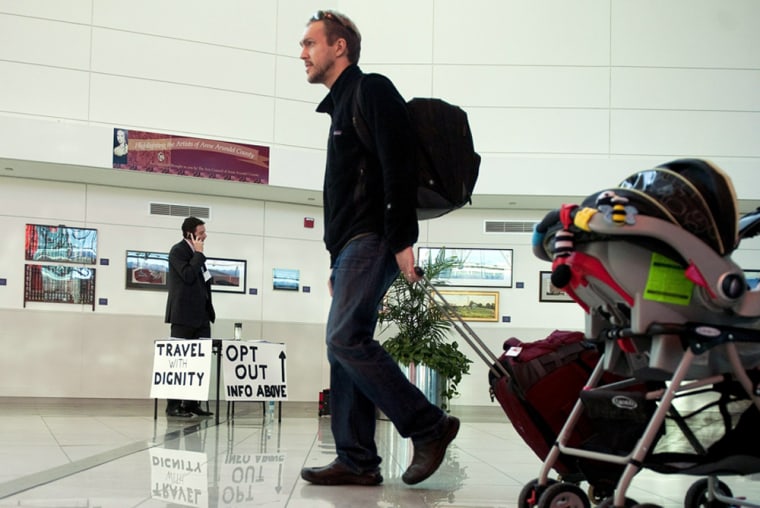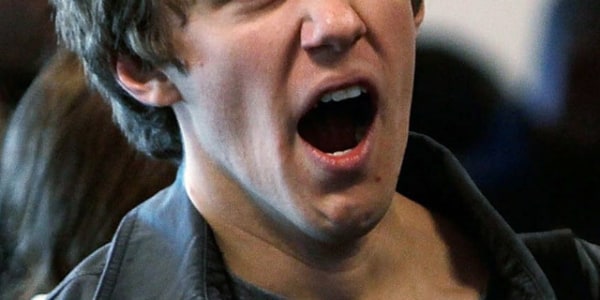The big Opt-Out looked like a big bust Wednesday as Thanksgiving travelers around the country patiently submitted to full-body scans and pat-down searches rather than create havoc on one of the busiest flying days of the year.
In fact, in some parts of the U.S., bad weather was shaping up as a bigger threat to travelers' hopes of getting to their destinations on time.
For days, activists had waged a loosely organized campaign on the Internet to encourage airline passengers to refuse full-body scans and insist on a pat-down in what was dubbed National Opt-Out Day. But as of Wednesday afternoon, the cascading delays and monumental lines that many feared would result had not materialized.
"It was a day at the beach, a box of chocolates," said Greg Hancock, 61, who breezed through security at the Phoenix airport on the way to a vacation in California. He was sent through a body scanner after a golf ball marker set off the metal detector.
His wife, Marti Hancock, 58, said that ever since she was in the air on Sept. 11, 2001, and feared there was a bomb on her plane, she has been fully supportive of stringent security: "If that's what you have to do to keep us safe, that's what you have to do."
The Transportation Security Administration said few people seemed to be opting out. Some protesters did show up, including one man seen walking around the Salt Lake City airport in a skimpy, Speedo-style bathing suit, and others carrying signs denouncing the TSA's screening methods as unnecessarily intrusive and embarrassing.
By most accounts, though, the lines moved smoothly, and there was no more or less congestion at major U.S. airports than in previous years on the day before Thanksgiving.
"I would go so far as to say that National Opt-Out Day was a big bust," said Genevieve Shaw Brown, a spokeswoman for the travel company Travelocity, which had staff at 12 of the nation's largest airports watching for problems.
Protest organizers — some of whom had no plans themselves to fly on Wednesday — were not prepared to declare the event a flop, saying the publicity alone cranked up pressure on the White House and the TSA to review their security measures.
"The TSA now talks about re-evaluating everything," said James Babb, an organizer for one of the protest groups, We Won't Fly. "That is a tremendous victory for a grass-roots movement."
Slideshow 10 photos
Thanksgiving travel
Minor protests
For days, the X-ray scans that can see through people's clothing and the new pat-downs that include the crotch and chest have been the target of a backlash among politicians, bloggers and others. The security screenings have been lampooned on "Saturday Night Live" and mocked on T-shirts, bumper stickers and underwear emblazoned "Don't Touch My Junk," from a line uttered by a defiant traveler in San Diego.
Security-line delays Wednesday at most airports across the country were 20 minutes or less. At Boston Logan International Airport, 300 passengers opted out of the full-body scans, according to the TSA, less than 1 percent of the 56,000 air travelers screened. In Los Angeles, 113 passengers opted out, and in Detroit, 57.
At Seattle-Tacoma International Airport, there were fewer than half a dozen protesters, including John Giordano, an IT technician on his way to see parents in Spokane, Wash. "I will opt out of 'porno machine' and choose the pat-down," he said. "But I won't turn back because I have to get where I'm going. My parents are getting old and they want to see me."
At the Phoenix airport Wednesday, husband-and-wife protesters Patricia Stone and John Richards held signs decrying "porno-scans" and drew sidelong glances from some passengers but words of support from others, who told them, "Thank you for being here."
"Just because you buy a plane ticket doesn't mean you have to subject yourself to awful security measures. It's not a waiver of your rights," said Stone, 44. "The TSA is security theater. They're not protecting us."
But many passengers brushed off such concerns.
In Atlanta, 22-year-old Ashley Humphries was given a pat-down search of her chest and crotch by a female screener after bobby pins in her hair set off a metal detector.
"I can see how it would make someone uncomfortable, but I'm not easily offended, so it really didn't bother me as much," said Humphries, who was traveling with her fiance to spend Thanksgiving with family in Tennessee.
The TSA has said the need for such measures was demonstrated last Christmas, when a Nigerian man allegedly tried to blow up a Detroit-bound plane with explosives hidden in his underwear.
As Opt-Out Day drew near, TSA chief John Pistole pleaded with Thanksgiving travelers not to boycott the body scans and prevent other people from getting home for the holidays. The fear was that if even a relatively small number of people opted for a pat-down, delays could quickly mount. Full-body scans take as little as 10 seconds, while pat-downs take four minutes or longer.
Fearing such delays, some passengers decided to go to the airport especially early and were pleasantly surprised.
Retirees Bill and Margaret Selfridge arrived three hours ahead of schedule at the Minneapolis-St. Paul airport for their flight to Washington. It took only 10 minutes to get through the checkpoint at 8 a.m.
"Now we get to drink a lot of coffee," Bill Selfridge said.
The weather, though, threatened to spoil some people's travel plans, especially in the West.
A ferocious, early-season snowstorm pummeled the Rockies, bringing whiteout conditions to parts of the region and closing roads. It was expected to delay air travelers and people who probably thought they were doing the smart thing by driving.
Freezing rain glazed roads in the Midwest, where at least three traffic deaths in Iowa were blamed on the weather. And windy weather in New England could create snags.
More than 40 million people plan to travel over the Thanksgiving holiday, according to AAA, with more than 1.6 million flying — a 3.5 percent increase from last year.
At least some people said they decided not to fly at all, in part because of the ai rport screening procedures. At an Amtrak station in Chicago, Pam Edwards said she decided to travel by train from Jackson, Miss., even though it would take 15 hours instead of two.
"With all the things with the TSA, I just decided it might be a little bit easier, stress-wise, to take the train," the 61-year-old retired preschool teacher said as she stepped off the train.
Edwards, who said she suffers from sleep apnea, travels with a machine to ease her breathing. She recalled her last flight and the hassle of being stopped by airport security because of the device.
"I was thinking, I don't know if I want to go through that again," she said.
Msnbc.com contributor Harriet Baskas and AP writers Michael Tarm in Chicago; Steve Karnowski in Minneapolis; Blake Nicholson in Bismarck, N.D.; Ted Shaffrey in New York; Eileen Sullivan in Washington; Ray Henry, Cara Rubinsky and Kate Brumback in Atlanta; Barbara Rodriguez in Chicago; Jay Reeves in Birmingham, Ala.; Tony Winton in Miami; Ron Todt in Philadelphia; Amanda Lee Myers in Phoenix; and Kristen Wyatt in Denver contributed to this report.

